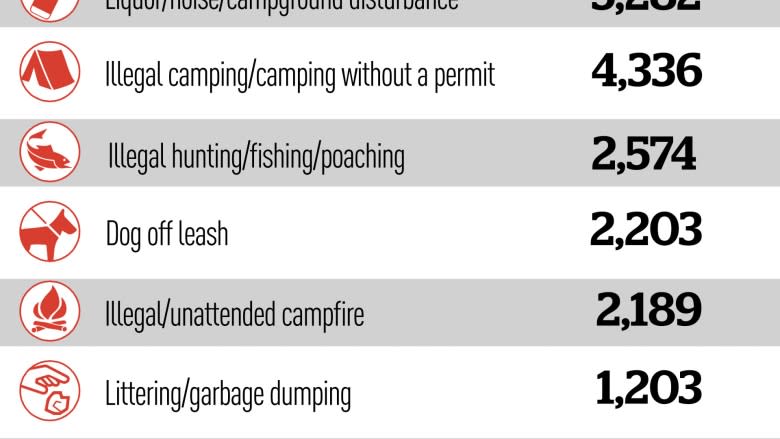Parks Canada preparing for busy Canada 150 season, including patrons behaving badly
Parks Canada is raising public awareness and adding patrols to prepare for a potential spike in visitors this summer, as a new report shows a steady increase in bad behaviour at campgrounds and other sites.
As part of Canada 150 celebrations, the agency is offering free access to parks and historic sites across the country through the Discovery Pass.
And more visitors will likely mean more park violations.
A recently released evaluation of Parks Canada's law enforcement program shows park wardens are already stretched, as a growing number of patrons violate park rules by harassing wildlife, making too much noise or pitching a tent without a permit.
The report shows the most common incidents are the party-type infractions.
In the six-year period tracked in the report between May 2009 and March 2015, there were 5,282 incidents related to liquor, noise and campground disturbances.
Another 4,336 incidents related to camping illegally or without a permit; 2,574 infractions were about illegal hunting, fishing or poaching; and another 2,203 were for allowing dogs off leash.
There were thousands more incidents of illegal or unattended campfires, dumping garbage and litter, harassing wildlife or firearms violations.
Enforcement meeting mandate
Law enforcement officers have dealt with some unusual infractions, including 48 cases of nudism, as well as serious offences such as break-ins, assault and domestic disputes.
Banff National Park, which includes Lake Louise, had by far the most violations, tracking about a quarter of all incidents across the country.
"Banff is by far our busiest national park, which means more potential incidents," said Parks Canada spokesperson Meaghan Bradley. "For that reason, we have more park wardens in Banff than anywhere else, so our ability to detect and respond to incidents is greater."
In total, there were 43,718 incidents across the national park system in the six-year period.
The evaluation finds the law enforcement program is generally meeting its mandate, but notes some gaps in service, including challenges policing the vast parkland.
Enforcement is focused on the perimeter or "front country," leaving big swaths of back country largely unpatrolled. This has led to illegal fires, fishing, poaching and antler collection, and in one extreme case, an illegal camper who was squatting on Crown land for nearly two years.
Wardens act as peace officers and can issue verbal warnings, file charges or make arrests and work with police and other law enforcement agencies. They also take steps to prevent offences by conducting patrols and educating the public.
The law enforcement branch was created in 2008 and authorizes Parks Canada to have up to 100 armed positions. It was in response to heightened safety risks, such as armed poachers or unruly behaviour with multiple offenders.
Parks Canada manages 46 national parks, 171 national historic sites, four national marine conservation areas and one national urban park.
Bradley said weather and other factors will determine how many visitors there will be during the Canada 150 peak season, but traffic is already up seven per cent so far this year with the Discovery Pass.
Parks Canada has upped cleaning and maintenance crews and enhanced front-country facilities to enhance capacity.
It has also increased education efforts and will redeploy staff where they're needed most. A small number of park wardens will be added for the summer.
"By combining awareness, prevention measures, and law enforcement actions, we can continue to protect national parks and wildlife across Canada, and to ensure enjoyable visitor experiences," Bradley said.
Other findings:
- Scheduling is aligned to operational demand, but sometimes allows only one park warden on duty at a time, which limits some actions like transporting a prisoner or conducting law enforcement by canoe, which require two persons.
- Since wardens were issued firearms in 2009, there have been no reported incidents where actions were deemed to be unreasonable or resulted in excessive use of force, and no lost, misused or accidentally discharged sidearms.



